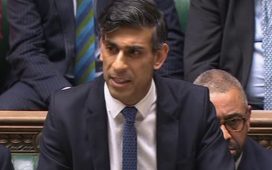This is not well done. The prime minister, Boris Johnson, displays cowardice and mendacity in insulting parliament with enforced suspension, and then in claiming that it has nothing to do with Brexit. It has everything to do with Brexit. It is not just an insult. It is a lie.
Theresa May, the leader whom Johnson treated abominably, stood in the House of Commons, day after day, pleading for support in honouring the vote on the 2016 Brexit referendum. She tried to ease the United Kingdom out of the European Union with a compromise deal respecting the diverse views of a divided nation. She was inept and she failed.
It was Johnson and his allies – in unofficial cahoots with Jeremy Corbyn – who stopped her. That Britain is still a member of the EU is their fault. The least they owe the country is the dignity of an orderly Brexit, not this shambles. Instead, like a school bully suddenly cowering in a corner, Johnson lacks the guts to do what May did and account for himself to parliament, despite knowing he lacks its support. To crown it all, he has the cheek to accuse those opposing a no-deal Brexit of being “undemocratic”.
Behind this week’s antics reputedly lies the hand of Johnson’s Rasputin, Dominic Cummings, ruling Downing Street while Johnson enjoys himself on social media and orders the Treasury to release billions in election bribes. The prime minister and his colleagues are ordered simply to incant “leave on 31 October”, as once they did “£350m for the NHS”. When we saw Michael Gove barefacedly deny that proroguing parliament had “anything to do with Brexit”, we could almost see Cummings’ strings in his back. It is an echo of Alastair Campbell and Tony Blair.
Is this a constitutional coup? The consensus, says Jonathan Sumption, formerly of the supreme court, is that Johnson is behaving unconstitutionally but not unlawfully. The constitutional reality is that a referendum can only be consultative, with parliament delegating to itself the honouring of the outcome. No one told the electorate what sort of Brexit was involved. It was for parliament to decide that. It decided against no deal but it then put into Downing Street a man who disagreed with it. Now it has left it too late to call that man to account.

Johnson’s prorogation is a blatant admission of democratic opposition to no deal. If that opposition weakens his negotiating hand, tough. He should have won the support of the Commons in advance. He is out on a limb. He may have a majority of his own Tory MPs behind him, but he knows this is not a majority of parliament or a majority of voters. A majority of a majority can still be a minority. Johnson’s supposed mandate for no deal is an electoral Ponzi scheme.
Opponents of no deal now have precious few moves they can make. I remain sceptical of parliament’s capacity, even at this last ditch, to stop Johnson’s antics. Its past handling of Brexit has been so casual, so half-hearted and so mired in tribalism as to render it an inadequate custodian of the national interest. Today’s MPs serve merely as an electoral college of government, and a poor one at that. As a collective, as a coherent political force, MPs just do not exist.
Hence the opposition’s “legislative route” to blocking no deal, much trumpeted last week, remains obscure. Anyway, there is no time. The alternative path of a no confidence vote followed by a general election would come too late to avert Brexit on 31 October. It would probably lead to a hung parliament – not to mention the break-up of the UK – but by then, having crashed out without a deal, the nation would be out of the EU and the single market. Heaven knows what will ensue.
The truth is that only one person (or two people) can avert a no-deal Brexit, and that is the Johnson-Cummings duumvirate who have backed it as a serious option for Britain’s future trade with the outside world. Britain is, as the Tory politician Quintin Hogg once remarked, an “elective dictatorship”. It has traditionally relied on dictators honouring precedent, dignity and proportionality. Most have. Johnson has not, but he clearly does not care. There is a Gatsby quality to him, of rich people having a good time as they “smashed up things and creatures … and let other people clean up the mess they had made”. That is the fate of all nations that put their faith in unwritten constitutions. They are vulnerable to rogues.
The irony of the latest turn of events is that, at the end of last week, faint shafts of light were emerging through the media miasma that passes for accountability under the Johnson-Cummings regime. Downing Street let it be known that May’s withdrawal agreement might after all be acceptable, if only the open-ended Irish backstop could be removed. Brussels in return let it be known that Johnson’s new Whitehall sherpa, David Frost, was in town, and that the backstop was the issue under discussion.
Limiting the open-ended nature of the backstop Johnson says is undemocratic would release him from his red line. It could be replaced by a time-limited one that crucially would be subject to parliamentary veto, and thus rendered democratic. This would enable the UK to withdraw in October on the basis of May’s deal. It would of course mean kicking the single-market issue down the road, but Brussels could not dictate the road’s length as before. As for another crisis two years ahead, we would at least be out of the EU, and tempers might have cooled. There might even be a new government.
Mooted alternatives – or add-ons – to a shift on the backstop include short-term sectoral deals, notably on agri-foods and medicines: a so-called standstill agreement to ensure that nothing changes on 31 October. This would enable the Irish border to be left open at least for now, rendering the backstop unnecessary. Though it would curb the scope for third-country deals involving these products, if Dublin’s Leo Varadkar were happy, so might be Brussels. Again Johnson could claim to have achieved Brexit with a deal. Parliament would surely agree.
The best news of all was Nigel Farage’s response to these rumours at the weekend. Farage has his spies, and clearly saw warning lights ahead. He exploded with fury at his London Emmanuel Centre rally. To enrage Farage stands to Johnson’s credit, for the moment.
I still think the old withdrawal agreement is not dead. I still regard it as an honourable referendum compromise. The Irish backstop could be diluted. The UK could leave the EU. The single market, however battered, could survive to fight another day. Johnson could claim a sort of victory and go into an election with a nation traumatised but sane. But then I am a member of the optimism party. Is Johnson?
• Simon Jenkins is a Guardian columnist













